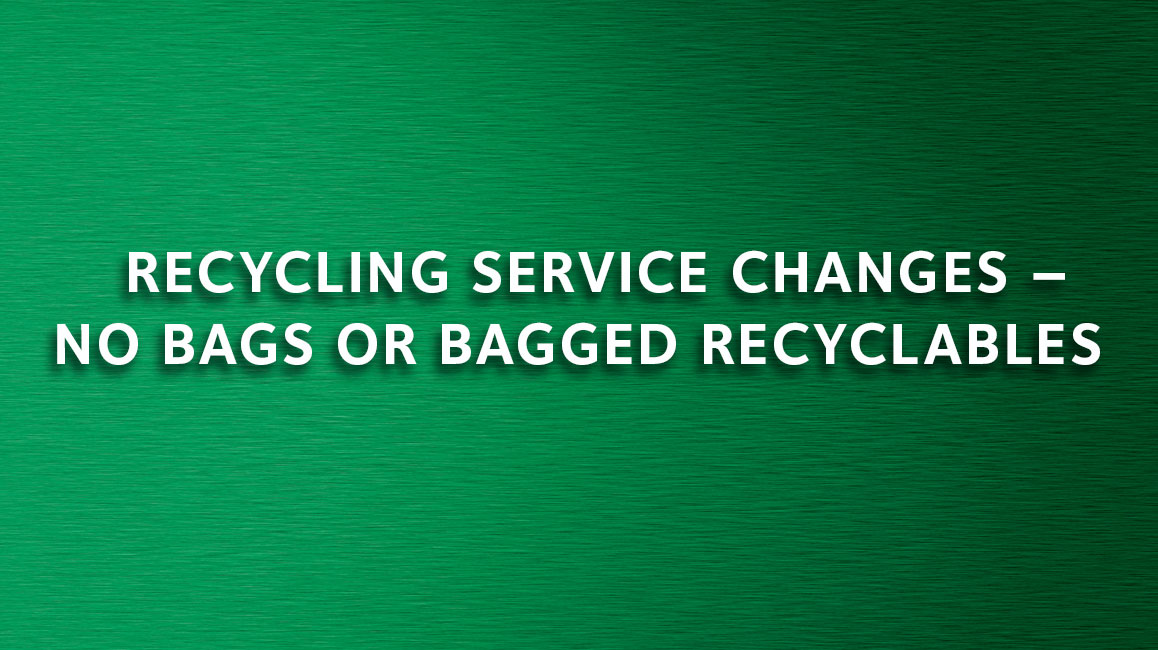
China’s Recycling Policy – What it Means to You
China’s import restrictions on recyclables have officially taken effect and are in full enforcement – effective March, 2018. These policies restrict the importation of certain recyclables and greatly reduce the amount of non-recyclable material (contaminants) they will accept down to 0.5% max. Waste Management is working to greatly enhance our efforts with all our customers to reduce the amount of contaminants in the recyclable material we collect.
One crucial component to achieving our goals is education. We are re-educating our customers on what materials to place in containers and what materials are prohibited – especially plastic bags and other plastic film, e.g. plastic wrap around cases of water or other beverages, plastic wrap on paper towels and toilet paper, plastic retail and grocery bags. The only acceptable materials in a recycling container are:
- plastic bottles and containers
- tin and aluminum cans
- beverage cartons (in most areas)
- paper
- cardboard
- glass bottles
Our recycling site RORR.com is kept up to date with the latest recycling industry news and best practices. Our Salespeople are armed with material on proper recycling and will work with new and existing customers to manage their programs. And, our Customer Service Reps are prepared to respond to any customer concerns and provide additional material on proper recycling procedures.
It all boils down to recycling the right items the right way. Basically, it’s time to get back the basics and to apply the same discipline we did years ago to the modern recycling programs of today. This can be done by following a few simple rules:
- Recycle all empty bottles, cans, paper and cardboard
- Keep food and liquids out of your recycling
- Keep plastic bags out of your recycling
What do these changes mean to you:
- You will experience service disruption to your recycling service should there be bagged recyclables or other contaminants in your container. In this event, you will have a chance to remove the contaminants so we can come back and service you, and will incur an additional trip charge.
- If we find contamination in your recycling material after it arrives at one of our recycling facilities, you may be responsible for additional costs associated with the separation of and proper disposal of the trash and recycling materials.
What can you do?
- Do not throw plastic liner bags filled with recyclables into your recycling containers. Empty the recycling contents only into your container, and throw the plastic liner bags into your trash.
- Consider discontinuing the use of plastic liners in your recycling bins throughout your company.
- Check out our Most Common Contaminants List and educate everyone in your place of business on items that do not belong in single stream recycling containers.
- Visit our online resource Recycle Often Recycle Right to see the wealth of recycling educational materials Waste Management makes available for you.
- Familiarize yourself on the latest global recycling changes and industry impacts:
- See why the battle against recycling contamination is everyone’s battle
- As US-China trade tensions flare, plastics, aluminum caught in the crossfire
- With China’s ‘nearly impossible’ contamination standard, where are MRFs looking now?
- What Chinese import policies mean for all 50 states
- Rethink the way you recycle
Waste Management is committed to recycling. We have invested millions of dollars in sorting technology and continue to invest but need our customers’ assistance to strengthen the recycling industry for a viable future. We appreciate your business, and are seeking to ensure the sustainability of our recycling efforts by eliminating contamination before it gets to any recycling facility. Thank you in advance for your assistance with improving the quality of material collected for recycling.
Should you have any questions regarding your recycling service, please check out Recycle Often Recycle Right at www.rorr.com or contact us at 800 972 4545.






